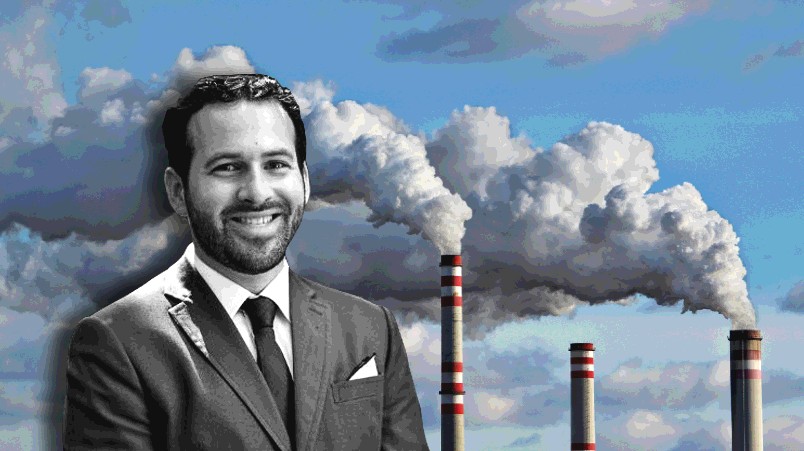‘ESG is facing its GDPR moment’: From 1 Jan European regulations will ‘change the game’ on global sustainability reporting – lawsuits, jail time have C-suite ‘freaking out’, marketing reined-in

No more smoke, no more mirrors: Salesforce's Ari Alexander on why the EU's incoming regulation will "change the game" on sustainability regulation, who drives the corporate ESG bus - and why some c-suiters are "freaking out" as a result.
Spreadsheets are not going to save the planet. The threat of jail time might. “The world is facing enormous challenges, the clock is ticking, we are in an emergency,” says Ari Alexander, VP and GM, Salesforce Net Zero Cloud. Yet most businesses are all over the place when it comes to their environmental data. That makes calculating where they are at nigh impossible, “let alone where they are going.” But regulators in the US and Europe are mobilising to make environmental reporting data as robust as financial data – and new standards will have profound implications for businesses globally. They can no longer hide, says Alexander, and the regulation is moving away from product-based carbon footprinting to enterprise-wide. As a result, marketers are already pulling back from green claims, with CPG giant Unilever being sued in Europe, per Alexander. He thinks it’s just the tip of the iceberg.
What you need to know:
- New EU regulation kicking in from 1 January 2024 will set the global standard for sustainability – especially carbon, per Ari Alexander, VP and GM, Salesforce Net Zero Cloud.
- The bloc’s lawmakers are bidding to make sustainability reporting as robust as financial data – and the new rules will affect those doing business in Europe.
- Fearful of gaps in their supply chains that could lead to non-compliance, big firms are shutting the doors on partners that are not on the same page.
- Alexander thinks its ESG’s GDPR moment – and says the C-suite execs in companies not ahead of the curve are “freaking out” over potential penalties and liabilities.
- The regulatory shift – as well as crackdowns on greenwashing – is driving companies and marketing away from brand-specific sustainability claims and storytelling to hard maths and physics-based enterprise-wide approaches, with CIOs and CFOs now stepping in.
- For those that continue to make product-based and marketing-led claims, be sure to make sure they are 100 per cent bulletproof, says Alexander.
- Get the full download. Listen to the podcast here.
The core tenants of a successful business in the future are going to be based on how you navigate this transformation.
Carbon crunch
ESG, or environmental social and corporate governance, is facing its GDPR moment, per Ari Alexander, VP and GM, Salesforce Net Zero Cloud.
European regulators, with the US Securities and Exchange Commission a “fast follower”, are pushing to make sustainability data as robust as financial data.
He says the implications, kicking in from 1 January 2024 in Europe, are profound – and further shift ESG from marketers telling a sustainability story on a product basis, to hard physics and defensible maths across the enterprise. That shift is causing some C-level panic attacks per Alexander.
The European Union’s Corporate Sustainability Reporting Directive (CSRD) means large firms with operations in the bloc – or doing business in it – as well as listed SMEs will have to report much more deeply on sustainability. The regulation kicks in from 1 January 2024 and over the next few years will capture more and more firms.
Alexander predicts the US will quickly follow with similar rules – but either way, like GDPR, thinks the EU’s approach will effectively set the global standard. Ultimately, it means sustainability and finance are becoming irrevocably intertwined.
“People are starting to talk about [corporate] valuations being determined on the basis of this kind of data,” per Alexander. Which brings a whole new level of enterprise risk to CFOs. Which is why “So many C-level executives are currently freaking out about this,” he says.
“This is becoming a totally different conversation. Not long ago, one or two fairly junior level people knew how to talk about [sustainability reporting], and almost no one else at the company did. All of a sudden, it's in board meetings, it's in the C-suite, it's in the news. And a lot of companies are waking up to the need to invest, take it seriously, start to prepare,” suggests Alexander.
“I think we're going look back and say this is basically the end of one era and the beginning of another when it comes to the sustainability conversation in the business world.”
I would say some years ago, marketing could be in a leadership position without necessarily talking to finance or it or sustainability when it came to crafting the message around sustainability. Those days are over.
Maths > storytelling
Alexander says the regulatory shifts are bringing CFOs and CIOs to the table with enterprise-wide thinking to the fore. He says the environment has moved from ‘storytelling’ to a hard “math and physics problem”, with much more caution about marketing individual products as ‘sustainable’.
Speaking to Mi3 in San Francisco, during Salesforce’s annual customer jamboree, Alexander said the shift in narrative – and those involved in telling it – was palpable.
“Here at Dreamforce, we’re hearing [about] CIOs with the remit to drive the sustainability transformation at their company. We didn't see that one or two years ago; we're seeing that all over in our customer meetings here … There are people involved from the CFO’s office, people involved who do sustainability for a living … people looking at this from a HR perspective… So there are lots of folks at the table,” says Alexander.
“The core tenants of a successful business in the future are going to be based on how you navigate this transformation.”
Marketing reined-in?
He suggests it’s the end of 20 years of “wild west” claim-staking on sustainability.
“We're turning the page to a compliance-driven apples to apples kind of exercise. When we think about financial data today, we don't really question what does this number mean relative to another company's report on that same metric. That's where sustainability data is going. It's a moment of increased standardisation, and that's happening on a global scale,” says Alexander.
“The overall phenomenon around regulation is driven by getting sustainability data up towards the level of financial data, so that it can be treated with the same rigour. And that's going to be a game changer for the conversation around sustainability, which has historically been much more, ‘say what you want, tell it how you want, and good luck out in the market with how they respond to it – whether they call you out for it or ask you tough questions about it’”
That means individual departments can no longer run with the sustainability ball, Alexander suggests.
“I would say some years ago, marketing could be in a leadership position without necessarily talking to finance or it or sustainability when it came to crafting the message around sustainability. Those days are over.”
We have to meet our climate targets at Telstra, so we are looking at our supply chain and saying 'if you haven’t got those things baked into your business, we are not going to shortlist you – it’s just not going to happen'. So it’s becoming increasingly like that in both directions.
P&L impacts
In Australia, the ACCC’s greenwashing crackdown has already seen a massive reduction in sustainability claims within advertising and marketing, with brands "terrified" of putting their heads above the parapet, according to the head of Australia's peak advertiser lobby, the AANA.
Alexander thinks the EU-led regulation will take the heat up another notch – because firms will have nowhere to hide and cannot risk doing business with suppliers that don’t also take a transparent approach end-to-end.
“The European Union will have requirements and expectations that companies above a certain size, amount revenue in the EU will have to account for their value chain or their supply chain emissions. And that's really where most of the environmental impact comes – not from your direct operational control, but from your supply chain,” says Alexander. “The standard being driven out of Europe will I think effectively become the global standard.”
Australia’s large corporates have read the runes and agree: Jeremy Nicholas, then CMO at Telstra, last year flagged that the telco is already keenly aware of the global implications of EU-led policy on its P&L.
“On the B2B side of our business, when we are selling Telstra to big enterprise, you need those [ESG] credentials, particularly if you are dealing with European companies, a lot of the big US firms – and certainly dealing at government level – you won’t get onto the procurement list,” Nicholas told the Mi3-LinkedIn B2B Next conference.
In turn, the likes of Telstra are pushing that mandate through their own supply chains – including media.
“We have to meet our climate targets at Telstra, so we are looking at our supply chain and saying 'if you haven’t got those things baked into your business, we are not going to shortlist you – it’s just not going to happen',” said Nicholas. “So it’s becoming increasingly like that in both directions.”
Alexander thinks firms that have voluntarily got their ESG houses in order “will not find the transition too onerous”. On the flip side: “I think that companies that had been waiting to see if this would ever have regulatory teeth, and are now for the first time trying to figure out where their utility bills are buried, are going to find themselves overwhelmed if they don't begin to prepare for that to affect them.”
That’s good news for someone tasked with selling Salesforce’s ESG Cloud. But bad news for companies that find they fall foul of the incoming regulation.
Because of the way the EU is organised, some individual countries have the ability to impose their own penalties ... The expectation is that there will be some countries who penalise companies that are not in compliance, both with fines and potentially with jail time.
Jail time?
“What are the potential consequences? In the first instance, shining a light on the truth is going to be the standard. You're no longer going to be able to hide in the shadows in the global square and not tell the world what the impact of you being in business is. That's a really serious moment for every company to recognise is happening,” says Alexander.
“Downstream from that, especially because of the way the EU is organised, some individual countries have the ability because of the CSRD to impose their own penalties on being out of compliance. The expectation is that there will be some countries who penalise companies that are not in compliance, both with fines and potentially with jail time,” adds Alexander. “And that's why this conversation is shifting so dramatically from where it's been to where it's going.”
Carbon hegemony?
While the EU’s CSRD encompasses all aspects of ESG, Alexander suggests carbon reporting is the big one: “What we're seeing so far in the prioritisation exercise around these next level developments in regulation, it's the carbon emissions that everyone can agree on.”
Which is why he says firms are shifting away from a product-focused approach to carbon footprinting to an enterprise approach, i.e. aggregating business and supply chain emissions. There is still an opportunity to market sustainability initiatives on an individual product basis – but it’s taking a back seat.
“What I'm seeing is those kinds of initiatives tend to be driven by the marketing organisation. And those marketers are more squeamish now, because of the backlash they've seen when some of the most sustainability-minded companies have got a lot of blowback in the global press.”
Asked to provide an example, Alexander cites one of the world’s largest consumer goods firms.
“Unilever, for example, is often associated with being a global sustainability leader. It sought to do this kind of [product-level] analysis [and] brand a bunch of their products [as sustainable]. And Unilever’s getting sued in at least one country in Europe for a claim about a particular product being sustainable,” per Alexander. “And it's made everyone think, especially if they're a much smaller company: ‘if we tried to do that we would be quite vulnerable to the blowback, maybe we shouldn't try that kind of tactic anymore’.”
Across the big firms, he says that is how the C-suite is now thinking.
“The Chief Financial Officer is thinking about the enterprise level claim – and the brand might stand to lose more from making a product-specific claim based on math that's harder to defend.”
The important conversation being raised around the accusation of greenwashing is ‘show me your math’. That's really important. You shouldn't be able to talking point your way through sustainability leadership. You really need to be able to prove it with defensible math.
Greenwash defence
With regulators cracking down on questionable sustainability claims, Alexander says bulletproof defensibility is the key issue for brands that do decide to take a product-specific approach.
“The important conversation being raised around the accusation of greenwashing is ‘show me your math’. That's really important. You shouldn't be able to talking point your way through sustainability leadership. You really need to be able to prove it with defensible math. This is a math and physics problem. Auditors are waking up to it and regulators are waking up to it. And for a long time companies have been able to get away with not having too many eyes on it. That's what's changing.”
New normal?
While some may be freaking out about ESG’s incoming GDPR moment, Alexander says the upshot is a more level playing field – because vastly more companies will be forced to share the burden of decarbonisation as the big firms push it through their supply chains in order to be sure of closing off routes to non-compliance.
As such, he suggests, “new channels of communication and trust and data sharing are about to begin”.
Time will tell. But the clock has been ticking for a while now.
Get the full download. Listen to the podcast here.


